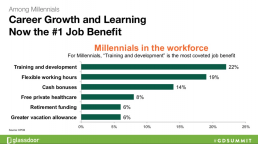Why bother spending money on L&D if people are going to move on anyway?
Well you don’t. You help people be better at work by investing in their development instead. And you both reap the benefits.
Easy right? Well not exactly.
The relationship between employers and employees is just about as complex as it can get right now. As individuals we’re more transient and more career focused than ever. Hard to believe, it’s estimated that the half of millennials will have 10-12 roles before they’re 38. Even right now, one in two of us have our eye on the exit door, looking for our next role.
As employers, you’re changing your approach too. Recruiting and restructuring quicker, mobilising people faster, and through outsourcing or leveraging contingent workers, your streamlining operations and reducing that greatest of overheads, staff costs.
Remember the psychological contract? Once a simple proposition, it’s now a thousand page hardback we’re scared to pick up.
In The Alliance, Reid Hoffman pressed that talent management should be built on the relationship you have with your employees before, during and after their stint with you. Stressing that it’s about seeing people not only as family when they’re on the books, but also as an extension of the organisation longer term. As ambassadors and as customers, as stakeholders for life. This is the reality. For most people, the twenty-year career is dead. Job hopping has become commonplace. A portfolio of experiences is the new norm. Thus, an alliance is the future.
Yes the relationship has been changing for sometime. But as employers you still need great talent. Productive and effective. And people want to feel like they’re learning. Like they’re truly developing.
And if you were in any doubt, individuals definitely want that. They crave development. Data from Glassdoor and Deloitte suggests millennials put Training and Development as the number one benefit they look for in a job. And that’s above pensions, health provisions, flexible working or bonuses.

So there’s demand for development. People need it and will go elsewhere if they don’t feel they’re getting it. It’s more important than ever to support your people.
Woven is to this mix is the question of how to create a unified and motivated workforce. Global engagement is worryingly low, sitting at 13% according to the latest Gallup results. Imagine the productivity gains to be realised for each percentage point increase.
It appears that attending to peoples’ craving for long term development would be an obvious starting point. If we adopt the attitude of oh well, they won’t be here for long then how can we possibly give them the skills and experience that drives them to want to engage with us? To speak highly of us? To buy or use our services in future. Or to want to come back and work for us in future?
Engagement through development is a must for any future facing business.
What’s really important is how responsibility for development is shouldered. There’s no disputing that it’s our careers and our development. But it’s not as simple as that. Being better at work encourages productivity, collaboration and a positive working culture. All of which drive the bottom line. The rewards of an engaged workforce can only be realised through employers making efforts too. So it’s critical for the c-suite to play a part.
Yes, people are going to leave anyway. They will. But grasping and working with the opportunity inherent is the only way forward. Being open about the modern relationship you now have with your people, helping them to learn and develop on their terms, as well as yours presents the best chance for engaging people in the time they’re with you and beyond.
Stating the obvious right? Sure. So what should individuals and employers being doing about this?
Well, it’s not as hard as you think. Stay tuned for more on that.
Photo by Stefan Stefancik
Get set for growth
Looking to take your own development to the next level, get WiseAmigo on today.
If you’d like to learn more about how WiseAmigo can help your business contact us.
SaveSave
SaveSave
